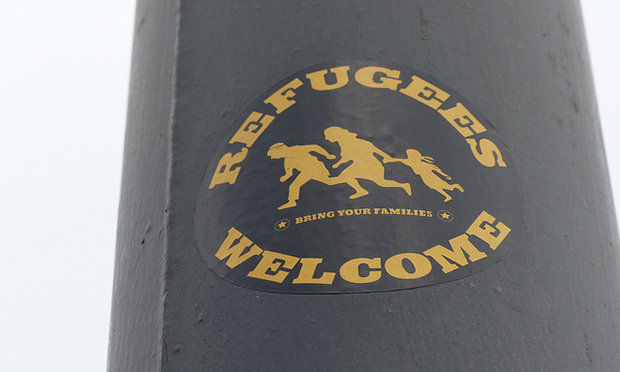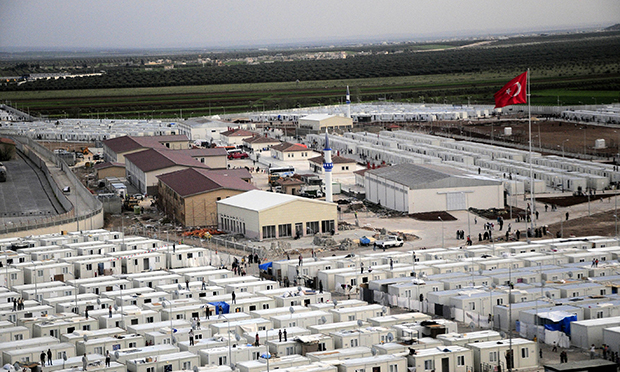More Syrian refugees arrive – but Hackney is only East London borough to take any

Photograph: Metropolico.org (Creative Commons)
Three more Syrian refugees have arrived in Hackney having fled their war-torn homeland, bringing the total number of people who have so far found sanctuary here as part of the government’s Syrian Resettlement Programme (SRP) to just six.
After months of painstaking planning, screening by the UN and Home Office and bureaucratic hoop-jumping, the couple and their child finally arrived on a flight into a London airport last week hoping for a new start.
They were met at Arrivals by a welcome party before being transferred to their new home in the south of the borough.
The trio, who had been living in a UN-run refugee camp close to Syria’s western border, received a welcome pack of groceries including tea and coffee and have been assigned an “integration caseworker” for 12 months.
Organisations working with refugees said it was too early for the family to speak publicly but acknowledged widespread interest in, and sympathy with, their plight.
Ali Aksoy, the director of Hackney Refugee Forum who himself fled conflict in the Middle East in the 1980s, said: “The most important thing for refugees is their family and their future. Many are fearful of being sent back, and many have mental health problems.
“Their health may be fine when they arrive at the refugee camps, but after so long waiting there, think about what that does to you.”
Syria’s catastrophic civil war has now been raging for six years. The UK has agreed to take in 20,000 Syrian refugees by 2020 – a number many campaigners regard as laughably small – from camps located outside of the EU. Dozens of councils nationwide are participating in this voluntary programme.
However, Aksoy warned: “Whether it’s 20,000 or 200,000 people Britain takes, there are millions of refugees over there. Just look at what’s going on in Aleppo – bombing, bombing and bombing.”
Funding concerns
Under the terms of their humanitarian visas, SRP refugees are entitled to stay in the UK for five years. Unlike many other types of migrants and asylum seekers, they are entitled to a wide range of benefits and are also allowed to work.
The government provides local authorities with around £8,000 per refugee accepted into their area under the SRP for the first 12 months of their stay. The money comes via the overseas aid budget.
Hackney’s Mayor Philip Glanville has committed to Hackney taking a total of seven families through the SRP by this Christmas.
But he has also warned that local resettlement efforts “can’t take away from our own resources” and must be supported by government funding for the entire five years that the refugees’ visas are valid for.
And he has made clear: “At this stage, we’re talking about taking tens, not hundreds.”
Zoe Gardner from Asylum Aid, a charity that represents people seeking sanctuary in the UK, said there were concerns about future funding.
She said: “The government is only providing guaranteed funds for the first year to cover the cost of hosting these families, when obviously there might be costs that extend beyond that first period – and there’s no guarantee it won’t be the local council footing the bill.”
The Home Office insisted councils will be able to apply for other types of funding after the first year, with a spokesperson assuring the Hackney Citizen that Hackney Council will not be left unsupported.
The Hackney Citizen understands some senior political figures in the Town Hall have previously indicated that as many as one hundred refugees, or 25 families, could be accepted into Hackney under the SPR scheme.
In addition to those who come in via this pathway, there are currently thought to be around 50 people who fled from Syria to Britain and travelled here through other EU countries, and who therefore are ineligible for SPR support, living in Hackney either in bed and breakfasts or private accommodation.
Some do not currently have refugee status as their asylum claims are still being processed.
Currently no Syrian asylum seeking children are in foster care in Hackney and the council confirmed that none had been placed in foster care outside of the borough since Syria’s civil war began.
A council spokesperson said: “In London, most unaccompanied asylum-seeking children are first referred for support by the immigration service in Croydon and local authorities in London then provided necessary support.”
Refugee Action, a charity, has been subcontracted by Hackney Council to provide much day-to-day care to SPR families. However, the Town Hall has refused to say much it is paying for this service, citing commercial confidentiality.

A camp in Turkey used to house refugees from Syria’s civil war. Photograph: Anadolu Ajansi/Adem Yilmaz (Creative Commons)
Gardner stressed that those accepted under the SRP had “very different rights to your average asylum seeker, or even your average recognised refugee” as they have been granted humanitarian protection.
She said: “What the UK has is a scheme called the Gateway Programme, which we’ve had in place for several years now. It is a resettlement scheme that applies more generally. It brings in about seven hundred people a year from six or seven key conflict zones and is operated with UNHCR.
But she added: “The spaces for resettlement in this country are ludicrously low as compared to the number of refugees who are living in desperate conditions – even just Syrians, let alone Iraqis or Afghans who simply don’t have this [SRP] option available to them at all.”
She urged people who want Britain to take in more refugees from Syria and elsewhere to pressure political leaders.
“I’m sure the fact Hackney has now decided to bring in these seven families will be in response to pressure from local citizens writing in and saying ‘Why aren’t we doing more?'” she said.
Willing landlords
The Syrians who arrived last week have been housed in the private rented sector, as were the first SRP family, also a couple with one child, who arrived in Hackney earlier this year and are understood to be living on the opposite side of the borough.
Accommodation for both families for two years was organised by Citizens UK, a grassroots group whose members include religious groups.
Caitlin Burbridge, from Citizens UK, said sympathetic landlords had agreed to take a hit on their rental income by letting their properties to the two families at the housing allowance rate for the first two years of their stay.
The particulars of their housing situation after this period are yet to be worked out.
Burbridge said: “We work in five East London boroughs. No other East London borough has resettled anyone – so we want to back and support the fact that Hackney Council has taken the initiative.”
The image of Syrian toddler Alan Kurdi’s lifeless body lying on a European beach after he drowned in the Mediterranean shocked many people into sympathy with the plight of those fleeing the war-ravaged country.
But Burbridge stressed those accepted into Britain under the SRP scheme, sometimes also called the Syrian Vulnerable Persons Resettlement Scheme, were the lucky ones.
She told the Hackney Citizen: “We recognise there’s a groundswell of support on this issue. Particularly the focus is now on the Syrian refugee scheme.
“We want to harness some of that energy to deliver support for Syrian families so we can find landlords that will take them.
“But our hope in the long run is that we can translate some of that support into support for people who have the same kind of needs but are from different countries – people who are in the borough already who have challenges with migration or their refugee status or asylum status.
“This might be a bit of a platform and a springboard for us to do that.”
Currently refugees make up only around six per cent of the immigrant population in the UK, according to Asylum Aid.
The government has said it condemns the brutal violence of the Assad regime and supports “diplomatic efforts to end the suffering and establish political transition” in Syria.
The government also says it is providing billions in aid to countries outside of the EU that are at the frontline of coping with the masses of refugees who have fled, and continue to flee, the fighting.
Louise Calvey, head of resettlement at Refugee Action, said: “Our dedicated staff and volunteers are looking forward to working closely with our partners to ensure these individuals and families, who have faced unimaginable horrors, are supported to rebuild their lives with dignity.”
